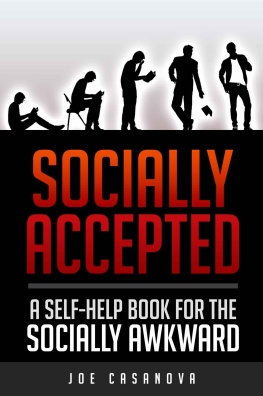Ty Tashiro - Awkward: The Science of Why Were Socially Awkward and Why Thats Awesome
Here you can read online Ty Tashiro - Awkward: The Science of Why Were Socially Awkward and Why Thats Awesome full text of the book (entire story) in english for free. Download pdf and epub, get meaning, cover and reviews about this ebook. year: 2017, publisher: HarperCollins, genre: Politics. Description of the work, (preface) as well as reviews are available. Best literature library LitArk.com created for fans of good reading and offers a wide selection of genres:
Romance novel
Science fiction
Adventure
Detective
Science
History
Home and family
Prose
Art
Politics
Computer
Non-fiction
Religion
Business
Children
Humor
Choose a favorite category and find really read worthwhile books. Enjoy immersion in the world of imagination, feel the emotions of the characters or learn something new for yourself, make an fascinating discovery.

- Book:Awkward: The Science of Why Were Socially Awkward and Why Thats Awesome
- Author:
- Publisher:HarperCollins
- Genre:
- Year:2017
- Rating:5 / 5
- Favourites:Add to favourites
- Your mark:
- 100
- 1
- 2
- 3
- 4
- 5
Awkward: The Science of Why Were Socially Awkward and Why Thats Awesome: summary, description and annotation
We offer to read an annotation, description, summary or preface (depends on what the author of the book "Awkward: The Science of Why Were Socially Awkward and Why Thats Awesome" wrote himself). If you haven't found the necessary information about the book — write in the comments, we will try to find it.
Ty Tashiro: author's other books
Who wrote Awkward: The Science of Why Were Socially Awkward and Why Thats Awesome? Find out the surname, the name of the author of the book and a list of all author's works by series.
Awkward: The Science of Why Were Socially Awkward and Why Thats Awesome — read online for free the complete book (whole text) full work
Below is the text of the book, divided by pages. System saving the place of the last page read, allows you to conveniently read the book "Awkward: The Science of Why Were Socially Awkward and Why Thats Awesome" online for free, without having to search again every time where you left off. Put a bookmark, and you can go to the page where you finished reading at any time.
Font size:
Interval:
Bookmark:
For my brother and sister,
who illuminated a better way
CONTENTS
I can feel everyone staring. The sharply dressed guests, all sipping their cocktails a safe distance from the pool, are surely wondering what I plan to do about the frail six-year-old struggling to stay afloat in front of me. Im wondering the same thing.
Every time I extend my arms toward the flailing child to offer help, my gesture is refused by his grating scream: Let me do it! I feel an uneasy sense of responsibility, but I want to respect his efforts, so I continue to let him struggle. The tension between the adults judging glances and this scrappy kids determination to persist has me caught in a seriously awkward position. And hes not even my kid.
Spencer was the son of my friend Zak, whom I had met in graduate school at the University of Minnesota. Zak and I had kept in touch and in the fall of 2013 I had a chance to stay with him and his wife, Lydia, while I attended a psychology conference in Florida. The day I arrived in Florida they happened to be throwing a birthday party for Lydia in their backyard. For some reason, Spencer instantly latched on to me as his new buddy, which was apparently a departure from his normally aloof disposition.
As people arrived at the party, they did the typical things adults do with six-year-olds. In their best kid voice they asked Spencer his age, gave him extra-cuddly hugs, or wondered aloud, Do you remember me, Spencer? They were being lovely, but this small talk in a party setting was like kryptonite for Spencer. I watched his body language slowly shrink while a palpable sense of anxiety began to overcome him. After a well-intentioned guest asked Spencer, Well, how did you get so handsome, young man? he abruptly turned toward me and said, I want you to help me with my swimming.
When Spencer and I looked toward Zak and Lydia for permission, they said it would be great if I could occupy Spencer while they attended to their arriving guests. As we prepared to get into the pool, Spencer told me, Yesterday, at my swim lesson, I practiced jumping into the pool and swimming back to the side. He demonstrated this feat two or three times, but then grew bored with his success. As he adjusted his Spiderman goggles, he proclaimed that he would try to swim the entire sixteen-foot width of the pool.
Spencer directed me to stay two feet in front of him while he dog-paddled his way toward the other side. During his initial attempts, he was having trouble making it past the midway point, and each time he began to flounder he rejected my attempts to help. Eventually he would relent, ask me for help, and I would carry him back to the ledge. After a minute of rest, he would say, Lets try again.
Im no Olympian, but even for a six-year-old Spencer did not appear to be gifted with much strength or coordination. His swimming had a decidedly spastic vibe and seeing it gave one a visceral sense of discomfort, which was accentuated by his loud gasps. I appreciated his chutzpah, but also worried about his ability to stay afloat. I looked to Zak and Lydia for some guidance; they nodded their heads as if this spectacular struggle was completely normal.
With each failure to reach the opposite ledge, Spencer became more agitated, and after his fourth failure he appeared to be on the brink of tears. When I sat him on the ledge I pointed out the tremendous progress he had already made and suggested that we try again tomorrow. But he was not looking me in the eye and in fact I dont think that he heard much of the easy out I provided for him. He appeared lost in his mind, replaying the causes for his failures and trying to think of better ways to approach the problem. He looked at me intently, though not quite in my eyes, and in a matter-of-fact tone said, One more try...
To understand Spencers ambition, it helps to know a little about his parents. During graduate school, Zak was one of the star students in applied mathematics. When he graduated, he took a job at NASA, where he was technically a rocket scientist. Lydia was one of the top intellectual-property attorneys in the country. Together they were a remarkable couple with high-powered intellects and ambitions, but they were also humble and generous people who had always been loyal friends to me.
While Zak was driving me back to their house from the airport, he told me that he had been deeply concerned about Spencer. During kindergarten, he showed little interest in playing with other kids, but when he did try to interact with his peers his efforts came across as overly intense and other kids found him to be odd. Its not unusual for children to be interested in space travel or trains, but Spencer was obsessed with questions such as planetary orbits and the mechanisms of combustion in different types of engines. The combination of his unusual interests and intense manner made it hard for him to play very well with others. Spencer was bored by his schoolwork and his teachers described him in terms usually applied to much older children, including bright, but disengaged and underachieving.
When Spencer launched into a monologue on planetary orbits or explained the mechanisms of steam engines, he sparkled in a brilliance that fascinated adults. His mind was always at work, generating observations by combining information from his large catalog of facts. Spencer was like a forty-year-old professor caught in a six-year-old boys life. But his social skills deficits were just as glaring as his precocious ability. His eye contact was erratic, his nonverbal behaviors were muted, and he generally played alone during recess.
The school counselor suggested that a child psychologist should evaluate Spencer for a disorder like attention-deficit hyperactivity disorder or a learning disability. One night after Spencer had gone to bed, Zak asked if I would take a look at the report, which had come back with nebulous recommendations. He knew that I couldnt act as Spencers psychologist, but he was desperate to get some insight into his sons mind and hoped that as a psychology professor I might have some advice on how to best support him.
The school psychologist found that Spencers IQ scores put him well into the top 1 percent of kids his age. His psychopathology test scores never crossed into the diagnosable range for disorders including ADHD or oppositional defiant disorder, but I saw a pattern of unevenness in his profile. His scores for self-control were in the bottom tenth percentile compared to those for kids his age, and his scores for obsessive tendencies were in the top fifth percentile. Spencer was a boy who did not fit neatly into a diagnosable category, but instead seemed to occupy a limbo in between normal and diagnosable. The psychologist gave Spencer a diagnosis of Pervasive Developmental DisorderNot Otherwise Specified, which I usually read as psychologist speak for, Something is socially problematic, but Im not sure what.
After we discussed the report, Zak and Lydia asked me a perfectly logical follow-up question, So what should we do? After a long pause, I replied, Im sorry, I dont know. My reply activated Lydias litigation mode and she began marching down a line of interrogation:
Why is he awkward? What makes him awkward?
Well, Lydia, theres not yet data to
How many kids feel socially awkward?
I dont know that anybody has investigated
Can you be awkward and happy? Do awkward people make friends?
Sure, but
How did you make friends? Youre so awkward.
Lydias face flushed with embarrassment. She launched into an apology for her last question, but I told her there was no need to apologize. For me, it was a refreshing realization that I had been happy with my life even though there were still discernible traces of awkwardness on display. The urgency in Lydias voice was a familiar tone, a near-panicked feeling that had once pervaded my private deliberations about how I could navigate a social world that seemed like it moved too fast for me to decipher its secrets. That panic had left me years ago, but I could not articulate how that change occurred or even what the change had been.
Next pageFont size:
Interval:
Bookmark:
Similar books «Awkward: The Science of Why Were Socially Awkward and Why Thats Awesome»
Look at similar books to Awkward: The Science of Why Were Socially Awkward and Why Thats Awesome. We have selected literature similar in name and meaning in the hope of providing readers with more options to find new, interesting, not yet read works.
Discussion, reviews of the book Awkward: The Science of Why Were Socially Awkward and Why Thats Awesome and just readers' own opinions. Leave your comments, write what you think about the work, its meaning or the main characters. Specify what exactly you liked and what you didn't like, and why you think so.



